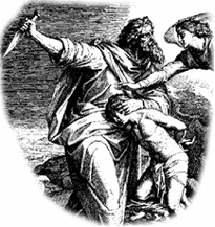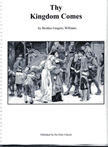Chapter 2. Abraham Uncivilized
Part 2 Two kingdoms

The generations of Cain and the generation of Seth to Noah walked different paths until the flood. After that great deluge, the first we hear of a city-state is the one called Babel, built by Nimrod.
“He was a mighty hunter before the LORD: wherefore it is said, Even as Nimrod the hunter before the LORD.” (Genesis 10:9)
The word “hunter” is from tsayid, which is more often translated “provision, food, food-supply, or victuals”. This verse would be better translated to the effect that Nimrod was a mighty provider instead of the LORD.
“And they said, Go to, let us build us a city and a tower, whose top [may reach] unto heaven; and let us make us a name, lest we be scattered abroad upon the face of the whole earth.” Genesis 11:4
The word “tower” in the above reference should be the subject of interest and controversy. “Tower” is translated from migdal, which would be the same as the word Magdala, as in Mary Magdaleen in the New Testament. Although it does mean “a tower”, it also has an elitist or elevated concept to its meaning and use. It can be used as we use the word “tree” in family tree. A similar association is also with the word “top”, translated from rosh, which takes many forms in other verses such as “head, chief, beginning, company, captain, sum, first, principal, and rulers”. None of this insinuates that a tower was not built, but that the focus should be on the infrastructure that supplied the organization, funding, and planning to construct a tower. This is more significant than the building.
Nimrod had amassed a gigantic political bureaucracy to perpetrate such public works. He had gathered people to labor and commit vast wealth into a centrally controlled government. With these monumental institutions also came politicians, bureaucrats, clerks and lawyers. It is clear from the present use of such elite classes in society that the people in subjection to Nimrod’s government were undoubtedly introduced to doublespeak, red tape, and legalese. These factors alone can confound whole societies so that no one knows what anyone is saying.
The people sought to possess the benefits of the City-State and the City-States sought to possess the people or, at the least, a portion of their rights. The people became the laboring asset of the State, as Israel was for Egypt. In more modern times, this statutory labor was called a corvee, which was nothing more than the compelled contributions or servitude of the people.
The system was predicated on the desire of each person, through the agents of their government leaders, to force their neighbors to contribute. When the burden and demands of the political contributions brought a threat of rebellion, the City-State often placated the people with promises of gifts, gratuities, and benefits, financed by debt or conquest. The Imperial State reached out to rob the citizenry of their future and even attach their children to debt. They took from their neighbor what they could no longer safely extract from the blood and flesh of its enfranchised members. Such states often became roaring beasts, enlarging their borders in a bloody colonial and imperial expansion.
“Thou shalt not covet thy neighbour’s house, thou shalt not covet thy neighbour’s wife, nor his manservant, nor his maidservant, nor his ox, nor his ass, nor any thing that [is] thy neighbour’s.” Exodus 20:17
The Merchants of Men
The word Kana`aniy [ynenk] can mean “descendant or inhabitant of Canaan”, but more specifically it means “a merchant, trader, or trafficker”. Were they called “traders” in Hebrew because they were good business men or was there another aspect to their character and methods that made them so detestable to Israel?
Sodom was a city like Canaan and, in it, the people were a possession of the State as persons.
“And the king of Sodom said unto Abram, Give me the persons, and take the goods to thyself.” Genesis 14:21
The Hebrew word translated “persons” here is nephesh. There are numerous different Hebrew words translated occasionally into the word “person”. Nephesh is translated “soul” 475 times and only translated “person” a few times. The use of the word “person” interchangeably with the word “soul” is not unheard of in the Bible, history or law.
“And the merchants of the earth shall weep and mourn over her; for no man buyeth their merchandise any more: The merchandise of gold, and silver, … beasts, and sheep, and horses, and chariots, and slaves, and souls of men.” Revelation 18:11-13
Knowing that the State considers that it owns the people as persons, which may include the idea of owning the very souls of men, can give new meaning to other verses in the Bible.
To understand history, it is of value to understand the historical concepts of law. This includes the laws that men make for themselves and the law by which they are authorized to make laws for themselves. What makes law, law? The precept upon which laws are constructed have remained the same throughout the ages.
Much of this construction of law is discussed in the book, The Covenants of the gods, but there are a few issues that need to be addressed just to clarify the concepts that form the union of man’s dominion into the City-States like Babylon, Sodom, and Egypt. The distinction between the words “man” and “person” seems trivial, but there are few concepts and relationships that are more important to understanding these issues.
The organized State is composed of what the law calls “persons”. These persons are specifically members. When reading legal forms and regulations, people should understand that there is a difference between a “man” and a “person” according to the law.
“This word ‘person’ and its scope and bearing in the law, involving, as it does, legal fictions and also apparently natural beings, it is difficult to understand; but it is absolutely necessary to grasp, at whatever cost, a true and proper understanding of the word in all the phases of its proper use… The words persona and personae did not have the meaning in the Roman which attaches to homo, the individual, or a man in the English; it had peculiar references to artificial beings, and the condition or status of individuals… A person is here not a physical or individual person, but the status or condition with which he is invested… not an individual or physical person, but the status, condition or character borne by physical persons… The law of persons is the law of status or condition.”
“A moments reflection enables one to see that man and person cannot be synonymous, for there cannot be an artificial man, though there are artificial persons. Thus the conclusion is easily reached that the law itself often creates an entity or a being which is called a person; the law cannot create an artificial man, but it can and frequently does invest him with artificial attributes; this is his personality… that is to say, the man-person; and abstract persons, which are fiction and which have no existence except in law; that is to say, those which are purely legal conceptions or creations.”
These “persons” have a status which includes obligations, duties, and allegiance as a part of their membership in the State which is not the same as the state of freedom enjoyed by the natural man. As a person, a portion of a man’s natural being or soul is incorporated.
“Membership in a political society, implying a duty of allegiance on the part of the member and a duty of protection on the part of society.”
Being a member of the State is dependent, not upon the man, but upon the person created by his relationship with the state. The person is not considered by his relationship with Nature and Nature's God, but by his covenants he makes with the State, both specific and constructive. Although men are created equal, they may not remain equal due to their oaths, applications, and participation with the institutions they create. Man, in his pure form, is in a state of Nature, but there is another State which is a quality that belongs to man as a person:
State: “That quality which belongs to a person in society, and which secures to and imposes upon him different rights and duties in consequence of the difference of that quality.”
“Although all men come from the hands of nature upon an equality, yet there are among them marked differences…”
“Three sorts of different qualities which form the state or condition of men may, then, be distinguished: those which are purely natural, those purely civil, and those which are composed of natural and civil or municipal law.”
As mentioned earlier in Micah, some would not partake in the error of the people, nor eat of the flesh of the caldron. Those who would not participate were warred against and persecuted.
“Thus saith the LORD concerning the prophets that make my people err, that bite with their teeth, and cry, Peace; and he that putteth not into their mouths, they even prepare war against him.” Micah 3:5
The early Christians suffered for much the same reason. They would not eat that which was sacrificed to idols as the Nicolaitans did. Their non-involvement created suspicion and envy, which led to most of the persecution by the Roman Empire and the civil powers of the world.
“If you will not be turned, you will be destroyed.”
These merchants of men were not exclusive to Canaan. There were men in Northern India who were called Asuras. They were identified as the mercantile caste. They built a huge system of irrigation lakes and canals. These monuments of engineering were accomplished by a readily available and large well-regulated labor force. This system both prospered and oppressed the people.
As they controlled the utility of these civic projects, they also controlled the people who depended upon the use of their production. Those who mastered the product of their common effort often expanded their personal wealth and power with an impoverishing effect on the general population.
There arose a ruling elite with the corresponding subjugation of the masses. Not only the circumstance of this economic system, but also the mind set of the populace kept the people subservient. The elite ruling class exercised an ever-increasing authority in the created legal realm, often with a uniform rise of injustice and oppression.
There was another group of people who opposed the Asuras’ desire for domination. This race of independent-minded people often stood and occasionally warred against these traffickers of bondage. In the totalitarian quest for the sweat and blood of men, appetite grows. The desire in some for individual autonomy and love of liberty becomes a thorn in the side of those ambitious merchants of men, the world of all Canaanites.
Return to Index of Chapters of "Thy Kingdom Comes"

Order the book
Thy Kingdom Comes
http://www.hisholychurch.org/order/materialskingdom.html










